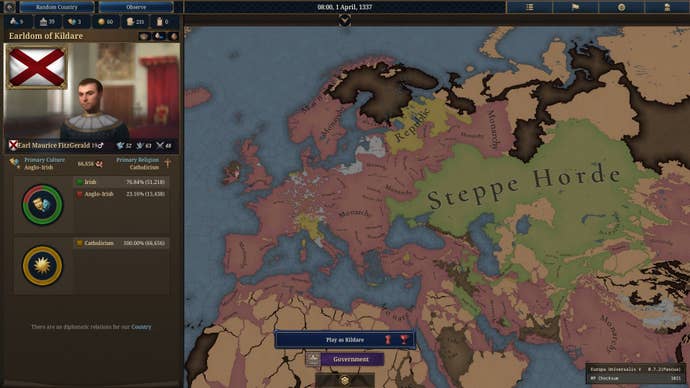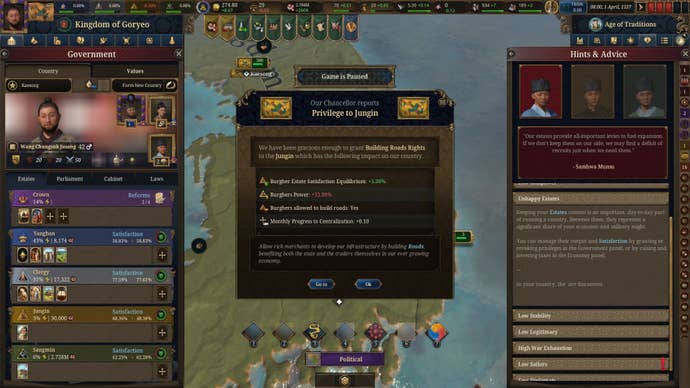The next grand strategy game from Paradox is Europa Universalis 5
Five guys, burghers and fries

Paradox have announced grand strategy game Europa Universalis 5, following some teasers last week. It's the next big entry in the series of complex globe-spanning historical simulations, and having played a little as the hapless ruler of Korea in the 14th century, I can confirm that it is so far as chunky, complicated, and deep as usual. The changes in this sequel won't look wild or revolutionary to a dabbler, but seasoned tyrants might find a lot to pique their interest. Come see a trailer below.
The developers announced the game in a recorded broadcast and you can see it now on Steam. If you're already sold on the idea of carving up England into easily digestible chunks, and simply want to read about every little detail, then just go straight to my other article that describes everything we know about Europa Universalis 5. It's big, but it's the most comprehensive summary of the game you'll find anywhere, or your florins back.
For everyone else, here's the skinny version. Europa Univarsalis 5 has been in development for the past few years at Paradox Tinto, a studio based in Spain. It's been called "Project Caesar" until now in an ongoing development diary, but it was clearly a Europa Universalis game to anyone who looked at the screenshots included in those dev posts. Over the past year, the developers have shared a lot of info on the historical map 'em up's new features.
In its broadest strokes, this is still a game of painting in the map your favourite colour and marching armies across land that's not yours to the chagrin of your neighbours. The twist this time is that you'll have to keep four competing interest groups happy throughout your rulership: the commoners, the clergy, the nobility, and the burghers.
These "estates" are roughly based on the political idea of the estates of the realm. Annoy the peasants too much and they'll start to get rebellious. Irritate the nobility and you'll have trouble leveraging them for their military power. That sort of thing. If you've played swipey kingdom management game Reigns, you'll get the idea. Except, of course, this will be much more finicky. As the crown, it's your job to placate peasant, prince and priest. The satisfaction levels of the estates will always be visible at the top of the screen.

One other big change is that the game will feature "pops", like in Victoria 3 - the little units of people who work, migrate, and die in your armies. And they'll have needs that must be met, usually in the form of certain trade goods as common as wheat or as precious as gems. Other than that, there are "Ages" that you pass through in certain eras (the Renaissance or the "Age of Absolutism", for example) and named characters like kings, artists, and ministers are a little more prominent than before.
I've been playing an early build of the game and it is quite the monster. Granted, I'm much more of a Crusader Kings 3 guy, but I can appreciate the vast and intricate machinery of a Europa Universalis. It is overwhelming in places so far (they haven't implemented a tutorial yet) and quite demanding of my PC given all the calculations happening. But this is sometimes the case with Paradox grand strategy, and I have spent a few afternoons as the frowning ruler of Korea struggling under the whip of imperial China but building a beautiful road network in the process. Pity about all the smallpox.
There's no release date yet. But I'll share more impressions over the coming days, but for now, grab a very large cup of tea and make your way through my exhaustive guide post.
The previous game, Europa Universalis 4, has been out for over a decade now, spawning dozens of DLC packs and getting countless updates. It's one of our readers' best strategy games of all time and the only game I have seen played in an actual castle. "EU IV is a fascinating simulation, an alternate history generator, a narrative tool and an entirely successful redesign of a strong formula," wrote Adam (RPS in peace) in his olde reviewe, written in approximately 1342.

